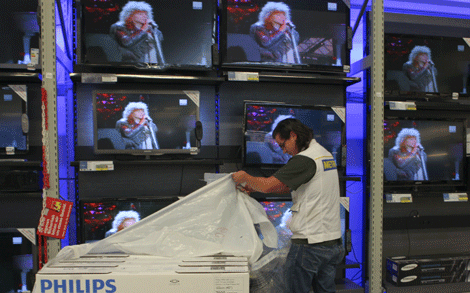German consumers increasing holiday spending this year
Updated: 2011-11-23 08:06
(China Daily)
|
|||||||||
|
|
FRANKFURT - Germany's government is offering 211 billion euros ($284 billion) in guarantees to save the European economy. The country's consumers are doing their part, too.
Germany, where the first Christmas tree was documented 600 years ago, will have the strongest growth out of nine European countries over the holiday season, with consumers increasing budgets by 2.7 percent, a study from the UK's Centre for Retail Research shows.
Germans may spend about 630 euros in each household on gifts, food and drink, travel and decorations, more than the European average of 605 euros.
"We have a 20-year low in unemployment," said Joerg Frey, an analyst at M.M. Warburg in Hamburg.
"The German consumer is concerned about the risks of the debt crisis, but he's not feeling them in his wallet right now," Frey said.
German shoppers have traditionally been Europe's laggards, with retail sales stagnating for most of the two decades following reunification in 1990.
Metro AG, the country's largest retailer, is counting on a Christmas rebound to make its full-year earnings forecast after quarterly profit disappointed investors eight times since the beginning of 2009.
Games, watches, jewelry, books and consumer electronics will be the biggest sellers as German retail sales grow by a projected 1.5 percent to 78 billion euros in November and December compared with the year-earlier period, according to the German Retail Federation.
No spending effect
"The crisis has definitely no effect on my spending behavior at this time of the year," said Marijo Knezevic, a 29-year-old portfolio manager from Bad Vilbel outside Frankfurt, who said he'll spend 2,000 euros to 2,500 euros on electronic goods, clothes, accessories and luxury goods for the holiday. "My family is trying to give our best to make it as special and as good as it was in previous years," Knezevic said.
Germans have little incentive to save, with interest rates at historic lows.
The European Central Bank cut its benchmark rate to 1.25 percent on Nov 3 as Europe fights a two-year sovereign-debt crisis.
German unemployment is currently at 7 percent, after falling in September to the lowest since reunification.
Metro said it's relying on Christmas to boost full-year earnings by 5 percent to 10 percent. Its stock has fallen 36 percent this year, the third-worst performance on the Stoxx 600 Retailing Index of 24 companies.
The company's Saturn consumer-electronics stores went online in October, a decade after Amazon.com Inc started selling to Germans, often at lower prices than Metro.
Consumer confidence
"We are confident that our Christmas business will be much better than last year", when heavy snowfall kept many would-be shoppers at home, Chief Executive Officer Eckhard Cordes said on Nov 3.
German consumer confidence will rise for the first time in eight months in November as salaries increase, market research company GfK SE said on Oct 25.
Domestic demand is improving as households expect an increase in income prompted by "the currently very favorable employment environment", the Bundesbank said in its monthly report on Monday.
"Companies are still pretty sound, so why should German consumers be afraid?" Frey said. "That's a different situation from Spain or Greece, where people already feel the pinch of a recession."
Bloomberg News












